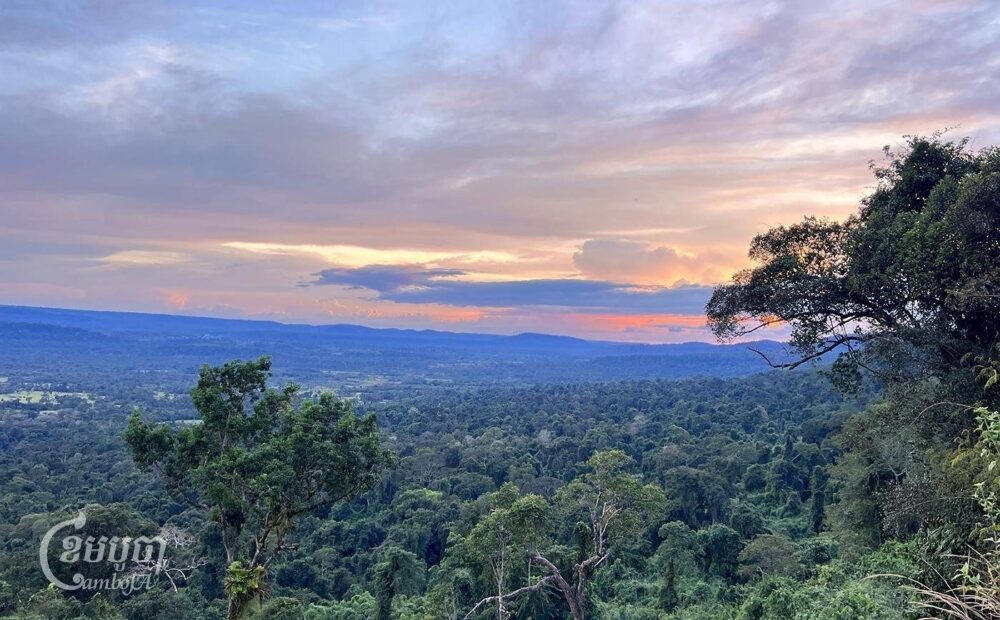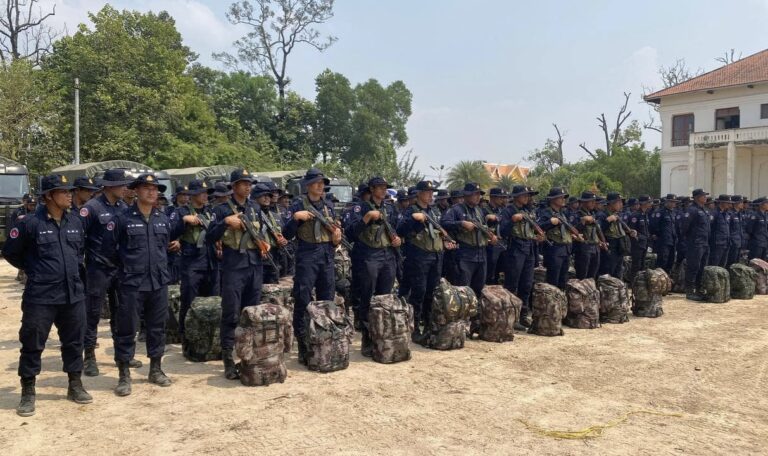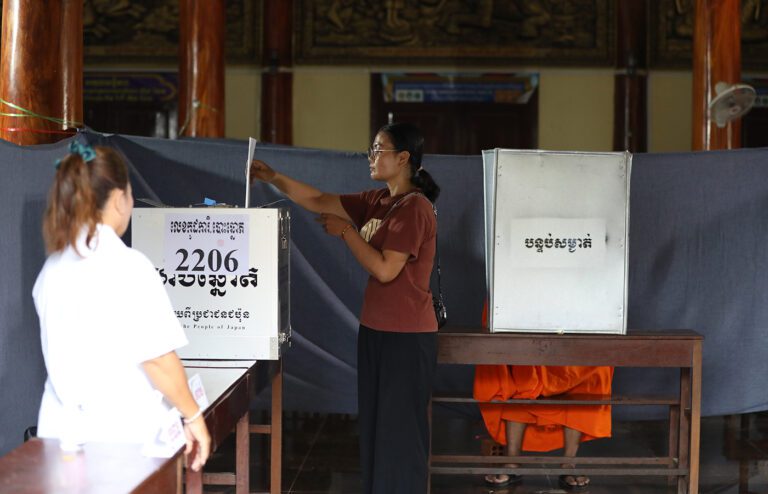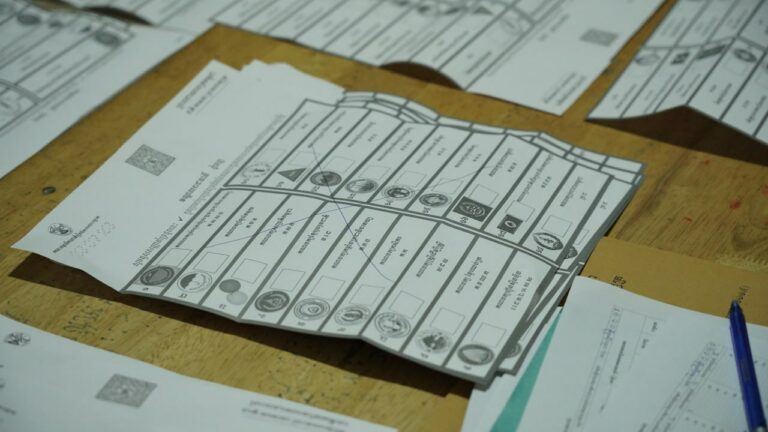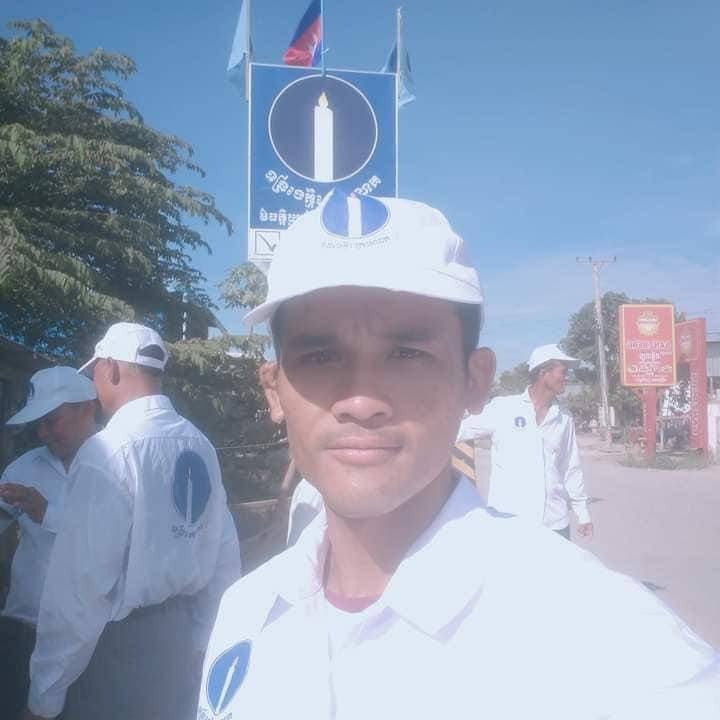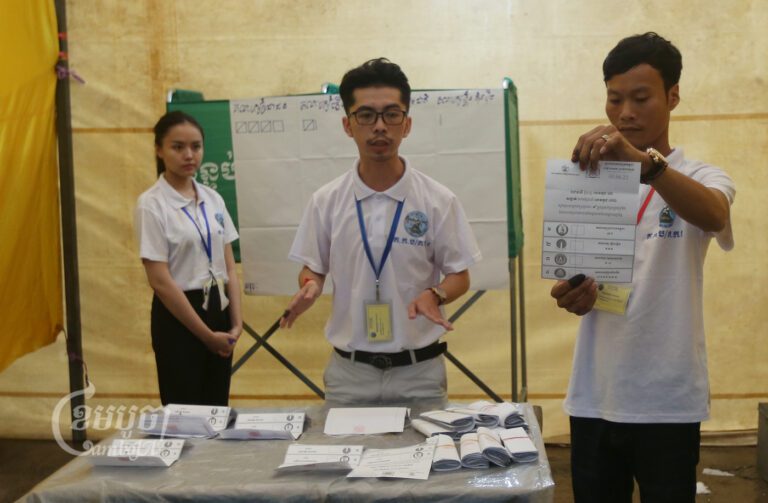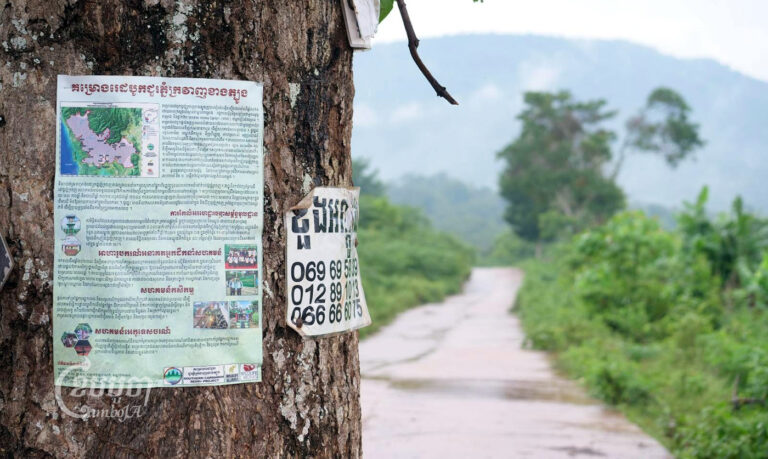A new report alleges that conservation NGO Wildlife Alliance forcibly evicted, arrested and mistreated members of the Indigenous Chong community who live in the Cardamom Mountain National Park in the name of a carbon offset scheme.
Human Rights Watch released on Thursday a report detailing two years of investigation into alleged human rights abuses across 23 villages in and around the Southern Cardamom REDD+ Project, a carbon offset project where conservationists attempt to protect and restore the forest funded by polluting companies and other entities that wish to lower their net carbon emissions. The watchdog alleges that the carbon offset project, carried out by the NGO Wildlife Alliance in partnership with the Environment Ministry, violated the rights of Chong residents through forced evictions, arrests of people farming and collecting forest products, and a failure to obtain free, prior, and informed consent.
“The Southern Cardamom REDD+ Project should be revised to ensure the Chong people’s effective participation in key decisions, titling of Indigenous communal land, and benefit-sharing agreements with the Chong that acknowledge they own the carbon stored in their territories,” said Luciana Téllez Chávez, senior environment researcher at Human Rights Watch (HRW) and the author of the report in a statement.
HRW spoke to more than 90 people living in villages included in the project and three government officials, in addition to analyzing satellite imagery, maps, news reports and social media posts.
Spanning about half a million hectares in the Cardamom rainforest, the conservation project is Cambodia’s largest REDD+ project, bringing in more than $18 million by 2021 in revenue from the sale of carbon credits.
In order to attract corporate buyers to support a carbon offset forest area, a third-party certification body must verify a project is fulfilling its goals and can absorb the carbon it promises to. Upon learning HRW’s preliminary results, Verra, the project’s certifier, opened its own investigation into the project in June and suspended issuing further credits. In an email to CamboJA News on Thursday, a Verra spokesperson wrote that the organization extended the scope of its review earlier in February.
Environment Ministry spokesperson Choup Paris did not respond to a request for comment.
Suwanna Gauntlett, the CEO of Wildlife Alliance (WA), wrote in an email that “we broadly take issue” with most of the allegations HRW sent to WA in November, adding that “the HRW comments present a fundamentally misleading and distorted picture of the project.”
“I would like to emphasize that, for over two decades, Wildlife Alliance has worked with local communities and the Government to preserve 3,913,851 Acres of dense jungle in the Cardamom Rainforest,” she wrote in the email. “Through the Southern Cardamom REDD+ Project (SCRP), millions of dollars have been invested in Cardamom Rainforest protection efforts and its indigenous communities,” adding that this includes financing roads, bridges, schools, medical centers and scholarships.
Questions Over Carbon Credit Accountability
Among its findings, the report alleges that the project failed to uphold Indigenous residents’ right to free, prior and informed consent (FPIC) and the larger audit system that’s meant to ensure that WA is informing its community stakeholders may be failing to properly check WA’s claims.
FPIC meetings with residents began in August 2017, 31 months after the January 2015 start date of the project, according to the auditing firm SCS Global. The firm noted this during its 2018 audit, but ultimately concluded that the project was “in conformance” with Verra’s standards.
The project also obtained two optional certifications which allowed credits to be sold at higher prices, both of which required obtaining FPIC from certain property rights holders, which HRW alleges the conservation group did not fulfill based on its research.
In an open letter, WA calls HRW’s criticism of the consultation process with Indigenous peoples “false and misleading.” In correspondence with HRW during the investigation, WA took issue with HRW’s view of the timeline of the project and how and when the FPIC process should be carried out. The public statement also lists “engagement” activities WA reports taking part in with community members from 2014 to 2023.
Christie Pollet-Young, vice president of climate at SCS Global Services, wrote in an email that the company was unable to provide commentary, as Verra’s review is “still ongoing.”
The HRW report argues that another auditing firm, Aster Global, initially opened an inquiry into residents’ concerns that they were not properly informed about the REDD+ project, but the concerns were later “effectively dismissed” after WA claimed in a response that the complaints were “from people who are committing illegal acts on property they do not own.” Aster Global did not respond to an emailed request for comment.
More broadly, HRW takes issue with Verra’s audit process as having “fundamental conflicts of interest,” as project developers pay the auditors that examine whether projects meet Verra’s standards.
Verra did not directly respond to the questions sent by CamboJA News, citing its ongoing investigation. But a Verra spokesperson wrote in an email that its verification process “follows the same practices for auditing and independence as those that extend beyond the voluntary carbon market and the nonprofit sector: the audited entity commonly covers the auditing costs.”
“Verra’s inaction for years in the face of the multiple red flags seriously calls into question its oversight and accountability mechanisms,” HRW’s Téllez Chávez said in a press statement. Verra should have responded to “multiple red flags” over the Southern Cardamom project’s almost 10 years of life, she said, adding that it raises questions about the operation of the entire project.
“These findings raise concerns about whether other carbon offsetting projects across the globe that were approved by Verra are causing harm to the very communities that most depend on forests for their livelihoods.”
Wildlife Works Carbon, a technical advisor and investor in the project, said in a public statement Monday that it stands behind the project.
“HRW has also attempted to accuse Wildlife Works of contributing to the allegations through Wildlife Works Carbon’s technical and financial support of the SCRP. We strongly refute this,” the statement reads.
Everland, a marketing firm that brokers sales of the project’s carbon credits, said in an emailed statement that the company “remains committed to the Southern Cardamom REDD+ Project,” adding it felt WA’s responses to the allegations were sufficient to retain the broker’s confidence.
Renewed Criticism
Through testimonials from Chong Indigenous residents, HRW reported new allegations of harassment and abuse at the hands of WA staff, Environment Ministry rangers and military police, including cutting village forests, burning crops, conducting arbitrary homes searches, as well as dismantling and burning huts. According to HRW, three residents were evicted from farmland and then detained for nine months without trial. The allegations in the report add to previous criticism about WA’s treatment of residents in and around protected forests over the years.
In one incident, a pregnant woman reported to HRW that while she was on her farm with her two young children, she was detained by a group of men. She said they told her to get on the back of a motorbike of a foreigner or she would be arrested, and then was driven to the village chief’s house. When the driver drove past the chief’s house, she jumped off the motorbike in fear. The men also dropped off her two children at her house where no adults were present, according to the report.
WA categorically denied the allegations: the NGO stated it never carried out forced evictions, sought criminal penalties for people collecting non-timber forest products, or conducted arbitrary searches of houses. As for the pregnant woman’s report, WA stated that the woman was clearing the forest illegally, the motorbike driver drove past the chief’s house because he didn’t know its exact location, and that “the woman caused herself minor injuries on her knees.” WA did not address the issue of the children being dropped off at the house unsupervised in its responses to HRW or in response to questions sent by CamboJA News.
CamboJA News has previously reported on home burnings carried out by WA staff, Environment Ministry officers and military police in a WA conservation site in Pursat province. Other news outlets and even Pursat provincial authorities have made similar accusations over the years.
Following the report’s publication, Gauntlet posted a statement on Facebook stating that WA had worked for many months and invested “tremendous time to engage in good faith” by providing data and community testimonials that “fully addressed” all of the issues HRW brought forward. She added that many of HRW’s criticisms of the project “conveniently fit the narrative” of HRW’s past advocacy on international carbon markets.
“The 29 communities who directly benefit from the project’s work, including the Indigenous Chorng people, overwhelmingly support the project – and express that support freely,” she wrote. “We fully recognize, like every conservation organisation, the importance of constantly engaging with communities and looking for ways to continue to improve. We have been sharing our continued work with HRW and, despite our concerns with their approach to date, we will read their report in detail and see what else we can learn and improve upon.”
In response to the report, Naly Pilorge, outreach director for the NGO Licadho, said that Indigenous peoples’ rights, in particular land rights, must be respected by environmental groups and the government in order for their conservation projects to benefit communities and meet international standards.
“Human Rights Watch’s research findings highlight the systematic abuses that are too often perpetrated against Indigenous peoples across Cambodia in the name of conservation,” she said.


